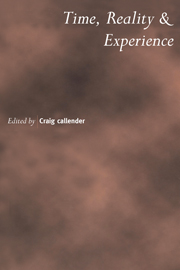Book contents
- Frontmatter
- Contents
- Preface
- Notes on Contributors
- When Time Gets Off Track
- Burbury's Last Case: The Mystery of the Entropic Arrow
- Zeno's Arrow and the Significance of the Present
- Presentism, Ontology and Temporal Experience
- A Presentist's Refutation of Mellor's McTaggart
- Time and Degrees of Existence: A Theory of ‘Degree Presentism’
- McTaggart and the Truth about Time
- On Absolute Becoming and the Myth of Passage
- Time Travel and Modern Physics
- Freedom from the Inside Out
- On Stages, Worms and Relativity
- On Becoming, Cosmic Time and Rotating Universes
- How Relativity Contradicts Presentism
- Can Physics Coherently Deny the Reality of Time?
- Rememberances, Mementos, and Time-Capsules
Burbury's Last Case: The Mystery of the Entropic Arrow
Published online by Cambridge University Press: 05 May 2010
- Frontmatter
- Contents
- Preface
- Notes on Contributors
- When Time Gets Off Track
- Burbury's Last Case: The Mystery of the Entropic Arrow
- Zeno's Arrow and the Significance of the Present
- Presentism, Ontology and Temporal Experience
- A Presentist's Refutation of Mellor's McTaggart
- Time and Degrees of Existence: A Theory of ‘Degree Presentism’
- McTaggart and the Truth about Time
- On Absolute Becoming and the Myth of Passage
- Time Travel and Modern Physics
- Freedom from the Inside Out
- On Stages, Worms and Relativity
- On Becoming, Cosmic Time and Rotating Universes
- How Relativity Contradicts Presentism
- Can Physics Coherently Deny the Reality of Time?
- Rememberances, Mementos, and Time-Capsules
Summary
Does not the theory of a general tendency of entropy to diminish [sic] take too much for granted? To a certain extent it is supported by experimental evidence. We must accept such evidence as far as it goes and no further. We have no right to supplement it by a large draft of the scientific imagination.
(Burbury 1904, 49)Introduction
Samuel Hawksley Burbury (1831–1911) was an English barrister and mathematician, who favoured the latter profession as loss of hearing increasingly curtailed the former. The Bar's loss was Science's gain, for Burbury played a significant and perhaps still under-rated part in discussions in the 1890s and 1900s about the nature and origins of the Second Law of Thermodynamics. One commentator of the time, reviewing Burbury's The Kinetic Theory of Gases for Science in 1899, describes his role in these terms:
[I]n that very interesting discussion of the Kinetic Theory which was begun at the Oxford meeting of the British Association in 1894 and continued for months afterwards in Nature, Mr. Burbury took a conspicuous part, appearing as the expounder and defender of Boltzmann's H-theorem in answer to the question which so many [had] asked in secret, and which Mr Culverwell asked in print, ‘What is the H-theorem and what does it prove?’ Thanks to this discussion, and to the more recent publication of Boltzmann's Vorlesungen über Gas-theorie, and finally to this treatise by Burbury, the question is not so difficult to answer as it was a few years ago.
(Hall 1899, 685)- Type
- Chapter
- Information
- Time, Reality and Experience , pp. 19 - 56Publisher: Cambridge University PressPrint publication year: 2002
- 3
- Cited by



